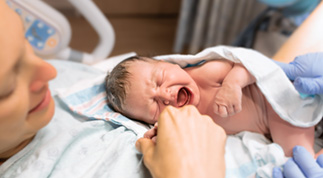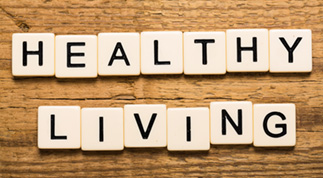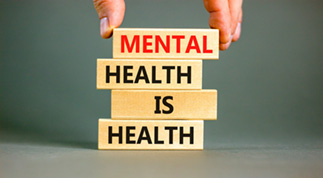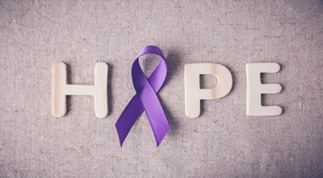Pregnancy is an exciting time but can also be a time filled with questions and worry.
Taking care of your health during pregnancy is important for both you and your baby. Below you will find some information on how to have the healthiest pregnancy possible.
In the planning stages of pregnancy? It's never too early to plan for a healthy baby. Visit our Planning for Pregnancy page to learn more!
Visit our Pregnancy Options page for more information about how to proceed after having a positive pregnancy test for an unplanned pregnancy.
Find prenatal, breastfeeding, and parenting services in Durham Region
Prenatal classes
Online prenatal, newborn and breastfeeding classes
Your easy guide to pregnancy and newborn care through InJoy Health Education. Our free online classes cover five topics – pregnancy, birth, breastfeeding, understanding your newborn and local community supports.
These classes are for everyone and can be taken at your own pace. Registration is valid for one year – you can start them early in your pregnancy or even before!
Support people are encouraged to take the classes as well.
SMILE prenatal classes
SMILE prenatal classes are free prenatal classes for expectant parents who meet the eligibility criteria.
SMILE prenatal classes are held in-person or virtually and are taught by a public health nurse. Each series consists of two hour classes held weekly for four weeks. Information covered includes self-care during pregnancy, understanding labour and birth, comfort measures for labour, newborn care and community resources to support new parents.
You are eligible for SMILE classes if you:
- Are under 26 years of age, and/or
- Have been referred by a community agency, and/or
- Are living with low income.
Virtual classes are live and require connection online or via phone. Dates and locations vary throughout the year and registration opens five weeks before the start of a series. Once a series is fully booked, the registration dates will no longer be visible.
Healthy eating and active living
| Healthy eating |
|
Eating healthy and making nutritious choices is especially important while you are pregnant. Eating well gives your baby the nutrients they need to grow and develop. It also helps lower your risk of having health problems during pregnancy, such as low iron or high blood pressure. Find out more about Healthy Eating for a Healthy Baby. |
|
Weight gain in pregnancy |
|
How much weight should you gain during pregnancy? The ideal amount of weight gain during your pregnancy depends on your BMI (Body Mass Index) before pregnancy. The Pregnancy Weight Gain Calculator will help you determine the weight gain that will promote a healthy pregnancy. |
|
Nausea and vomiting |
|
Mild nausea and vomiting is a normal part of pregnancy. It usually starts around the sixth week of pregnancy and improves by the twelfth week. For some women it persists throughout pregnancy. While it can be very unpleasant, the good news is that mild nausea and vomiting is not harmful to you or your unborn child. There are many ways of easing your nausea and vomiting. Here are some tips to help you feel better during pregnancy. |
|
Is it safe to use cannabis for nausea and vomiting? |
|
There has been an increasing belief that cannabis is natural, harmless and can relieve some of the symptoms of pregnancy, such as morning sickness, nausea and vomiting. There is no known safe amount of cannabis use during pregnancy or breastfeeding. Cannabis reaches your baby during pregnancy and may cause harmful long-term effects on your child’s development. The safest approach is to not use cannabis. Talk to your health care provider if you have severe nausea and vomiting or before taking any medications to help you cope. |
|
Physical activity |
|
Exercise is an important part of a healthy lifestyle and most pregnant women can and should exercise. Exercise provides many benefits such as:
Pregnant women should accumulate at least 150 minutes of moderate intensity physical activity each week. Speak to your health care provider if you have questions about exercising during pregnancy. Read more about exercise in pregnancy. |
|
Gestational diabetes |
|
Gestational diabetes happens when your body is not able to produce enough insulin during pregnancy. This may lead to health problems for you and your baby. There are things you can do to prevent and treat gestational diabetes. Find out more about Gestational diabetes For tips on managing gestational diabetes, visit Diabetes Canada |
Alcohol, smoking and drugs
There are changes you can make to help you have a healthy pregnancy including stopping or reducing use of alcohol, cannabis, and drugs. This will help give your baby a safe and healthy start to life.
| Alcohol |
|
Consuming alcohol during pregnancy can have serious effects on your baby. No amount of alcohol is safe during pregnancy. If you drink alcohol while pregnant it can enter the baby’s bloodstream and may lead to the development of Fetal Alcohol Spectrum Disorder (FASD), which can cause lifelong physical, mental, and behavioural disabilities for the child. Fetal Alcohol Spectrum Disorder (FASD) can impact the baby in many ways:
If you need help with your alcohol use during pregnancy talk to your health care provider. |
|
Tobacco |
|
Quitting or reducing smoking is one of the best things you can do for yourself and your baby. Smoking and second-hand smoke, including vaping and e-cigarettes, are harmful to both you and your baby during and after pregnancy. Smoking while pregnant can cause:
Quitting smoking while you are pregnant is safe for both you and your baby. Talk to your health care provider for help. More information on smoking and vaping. |
|
Cannabis |
|
Cannabis, also called marijuana, weed or pot, is the most commonly used recreational drug among pregnant women. Cannabis in all forms, whether smoked or vaped, eaten, applied as a cream, or taken as a pill, may affect your baby’s brain development and can result in learning and behavioural issues that last throughout their life. There is no known safe amount of cannabis use when pregnant or breastfeeding. Using cannabis in pregnancy is not safe because your baby:
Using cannabis in pregnancy can affect your child's:
Learn more through our free online prenatal classes. What you need to know: cannabis, pregnancy and breastfeeding. Thinking about using cannabis before or during pregnancy? Get the facts here. Frequently asked question about cannabis use in pregnancy. |
|
Opioids |
|
Opioids refer to several drugs, including prescription opioids for pain control, such as hydromorphone and oxycodone, and unregulated drugs, such as heroin. Opioid use during pregnancy can affect your health and the health of your baby. Opioids can alter your baby’s brain development and may lead to learning and behavioural problems that last throughout their life. If you suddenly stop taking opiates during pregnancy, it may cause early labour or miscarriage. There are safe and effective treatments available to help women manage opioid use during pregnancy. Speak with your health care provider to learn more about your options. Learn more about pregnancy and opioids and opioids and overdose prevention. |
Find out more: Your Guide to a Healthy Pregnancy.
Find support here: Prenatal, Breastfeeding and Parenting Services or talk to your health care provider
Contact Us













